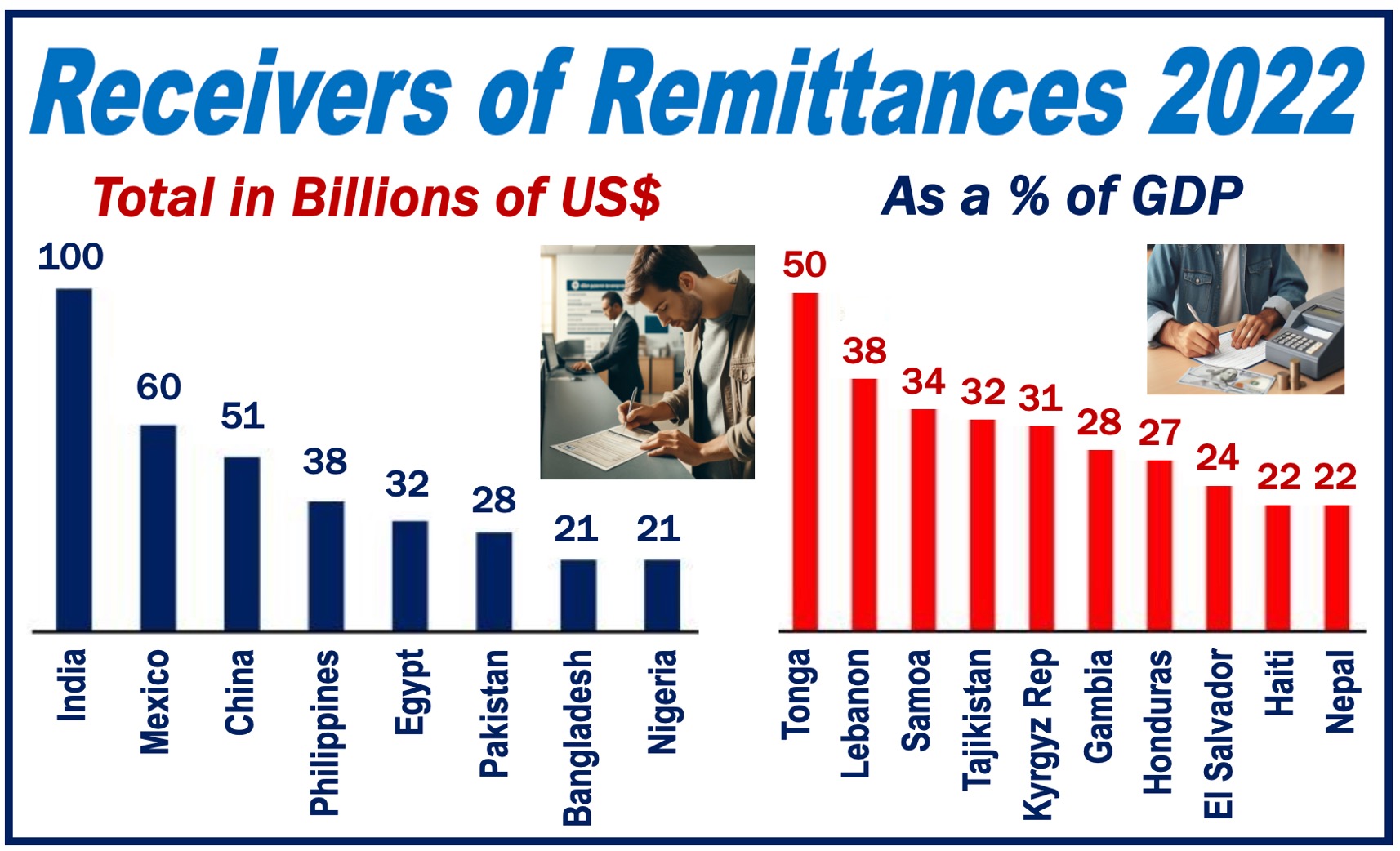Remittances are money transfers that people send from one country to another. Usually, the sender is working abroad, as a migrant worker, and transfers money to family members in their home country. The sender has moved abroad to find better work opportunities and support their families back home.
The International Monetary Fund, The World Bank, and many other organizations use the term “workers’ remittances” or “migrant remittances.”
In many emerging and developing economies, remittances are the largest source of foreign currency.
Technically, “remittance” means an amount of money that you send to somebody. However, over time the meaning has become more specific and suggests that the money is sent to relatives back home while you work abroad.
Thestreet.com says the following about the meaning of the term:
“Remittances are payments for goods or services, or gifts, and are typically wire transfers in which a person from one place sends money to a person in a different place. They are often transfers of capital from people in “developed” countries to people in “developing” nations. That money is usually used to help pay for a recipient’s living expenses such as food, housing, and clothes.”
Derivatives of “remit”
“Remittance” is a derivative of the verb “To Remit.” Below you can see other derivatives of “remit” with meanings that are related to the theme of migrant workers sending money home, and an example of the word in a sentence:
- Remit (Verb) – To send back (money) in payment or as a gift.
Example: “Every month, he makes sure to remit a portion of his salary to his family back home.” - Remittance (Noun) – Money sent in payment or as a gift.
Example: “The family eagerly awaited the monthly remittance from their father working abroad.” - Remitter (Noun) – One who sends payment.
Example: “The remitter’s name is listed on the transaction for the bank to track.” - Remittee (Noun) – The person to whom a remittance is sent.
Example: “As the remittee, she collects the funds sent by her husband every month.”

Why Do People Send Remittances?
There are many reasons why people send money home. Let’s take a look at the most common ones:
-
Supporting loved ones
Millions of migrant workers across the world send money to their families back home. This money helps cover basic needs like food, clothing, housing, education, utility bills, and healthcare.
-
Building a better future
A migrant worker may also send money for savings, investing in a small business, or buying a property back home.
-
Repaying debts
Some people may have incurred debts to cover the costs of moving to a new country. Remittances can help them repay these debts.
-
Investment in Community Projects
Some migrants organize themselves to fund larger community projects in their hometowns, such as building schools, health clinics, or infrastructure improvements.
How Do Remittances Work?
Here are three of several ways people can send remittances:
- Money transfer companies
Companies like Western Union and MoneyGram allow people to send money from one part of the world to another.
- Banks
Many banks offer international money transfer services.
- Online platforms
A growing number of online platforms specialize in sending remittances internationally. These often offer competitive exchange rates and low fees. Examples include Wise, Xoom, WorldRemit, Remitly, and Skrill.
The Importance of Remittances
Remittances play a significant role in the economies of many countries around the world. They offer the following advantages:
-
Reducing poverty
They provide a vital lifeline for families in developing countries, helping them escape poverty.
-
Stimulating economic growth
Most of the money that migrant workers send home is spent locally, boosting businesses and creating jobs.
-
Improving financial stability
Remittances can act as a safety net during economic downturns or times of crisis.
-
Economic security
Millions of families today enjoy economic security thanks to the remittances they receive from family members abroad. Economic security, in this context, refers to the feeling of stability and safety when it comes to our finances.
Final Thoughts
Remittances are more than simply money transfers. They represent the hard work, sacrifice, dedication, and love of people who have moved abroad to seek a better life for themselves and their families.
The money that migrant workers send back home makes a tangible difference to the lives of millions of people globally.
